A Quarter of a Century in the Alps
Aita Largiadèr
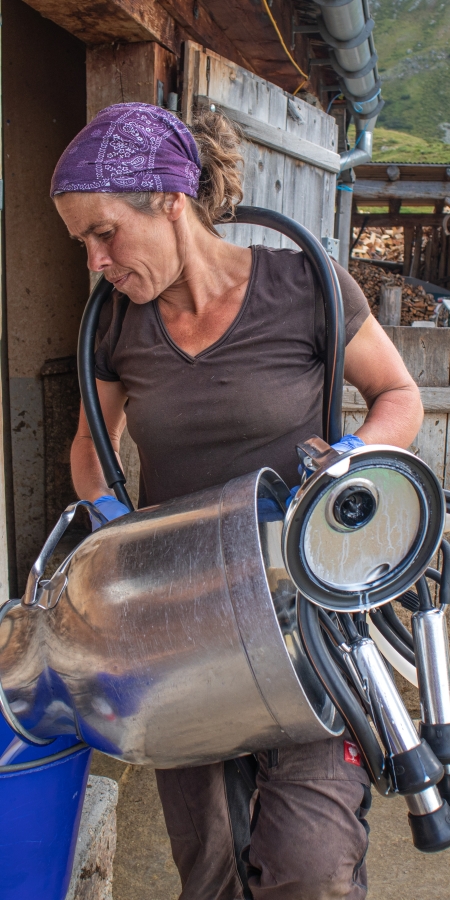
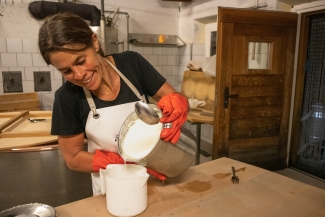
Even though the popular perception is sometimes different: working on the alp is no walk in the park. After all, salt is quite a defining element. Because the sweat sometimes runs in streams. Or the cheese is smeared with it, and yes, if it's up to the cows, they really enjoy licking the salt. Back to sugar: summer in the mountains with dreamlike sunsets, tranquillity far from the hustle and bustle of the big city, closeness to nature, work with animals and simple living is only one – undeniably beautiful – side of the coin. The picture of the romantic life of an alpine farmer is marred by 14-hour working days without weekends, storms, worries about sick animals and physically demanding work. But what is it that has kept Aita and her partner Berni coming back to «their» Alp Prasüra in Val Müstair every summer for a quarter of a century?
The early bird gets the worm...
...and a lot of work ahead. Because it's already 3.30 a.m. – it's still pitch dark even in the height of summer – when Aita has to wake up for the day. At best, that means six hours of sleep, usually less. From then on, every move is perfect, all processes are well-rehearsed and timed to the minute. If something goes wrong, the whole daily routine is shaken. One could almost assume that the timetable was originally invented for the Alp. The wood stoves for hot water and steam have to be heated, the milk skimmed and slowly warmed up in the kettle, the butter churn put into operation and the cheese from the previous day weighed and stored in the cheese cellar. Likewise, the cultures have to be prepared for cheese, butter and yoghurt production.
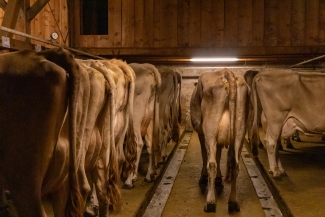
Meanwhile, Berni and Marc the dog are out in the surrounding meadows to drive the cattle back to the alp. At first it takes more time to put the cattle in the stall, but after a few weeks most of the cows know their place in the stall. So it's all very quiet: one animal after the other is led to its place by Berni, Aita and their two assistants Marianne and Marianne. The older ladies among the cows, long experienced in the Alps, find their place on their own. Only when all the cows have been taken care of is there a short break for the humans, too. It is now 5.30 a.m. – time for breakfast.
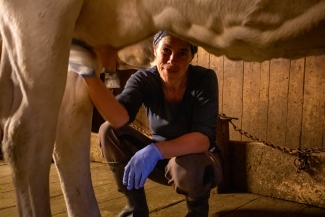
A closed circuit
As a dairymaid, Aita is responsible for the dairy and thus for processing the milk into cheese, butter and yoghurt. But before that, it's time to milk the 50 or so cows. It's a job Aita particularly enjoys: «I'm fascinated by the good-naturedness and calm that these big animals radiate. Despite the bells they carry, there are moments when it is very quiet in the barn.» Milking in the morning and evening takes about 1.5 hours, although the amount of milk being milked decreases towards the end of the alpine season. During milking, the animals are also checked for health.
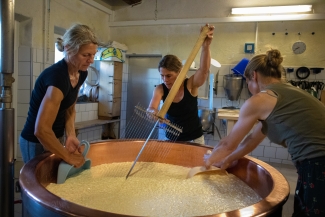
«If you are not careful, this not only has negative consequences for animal welfare, but can even lead to entire days' production of milk and cheese becoming inedible.
If the cows are doing well, the milk quality is also good,» the dairy farmer is convinced. For her it is important that she processes the milk on site and does not deliver it to a cheese dairy. So on Alp Prasüra you work in a small, closed ecosystem where at the end of the day you also have something in your hands: Milk, yoghurt, butter and of course cheese.
Sweaty cheese production
At 7.30 a.m. work begins in the alpine dairy. The sour cream butter is formed into 500 g modules by hand, while next to it the milk is heated with steam in the boiler. As soon as the lactic acid bacteria are added with the rennet at around 32°, the milk thickens. It is now cut up with the cheese harp so that so-called curds (fine grains) are produced. These grains are stirred continuously until the desired temperature is reached. The cheese is then extracted individually with a large cloth, i.e. the cheese mass is lifted out of the kettle and pressed into the prepared moulds. A sweaty and strenuous undertaking that requires a lot of practice and is not only manual but even jaw work!
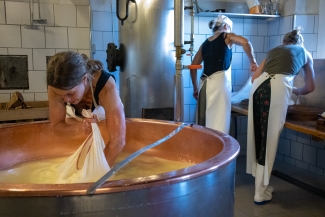
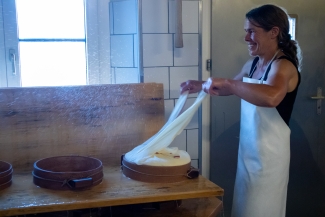
At a constant temperature and high humidity, the cheese then matures in the cellar and is turned, lubricated and cared for every 1-2 days from then on. Aita and her team produce around 3-3.5 tonnes of cheese and 300-350 kg of butter per season. A small part of it is sold directly «over the street» to hikers, the rest is distributed proportionally to the farmers – who are also Aita's and Berni's employers.
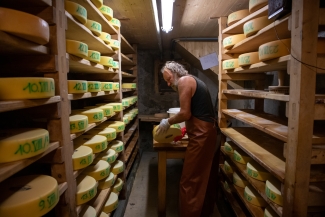
Nothing is as constant as change
Alpine life in Val Müstair has also undergone a great change in recent years: Whereas in the beginning there were cattle from around 10 local farmers on the Prasüra Alp, today there are only a handful. Structural change does not stop at 2,100 metres above sea level. The bottom line is that although the number of animals is similar, the cows today are considerably larger, give more milk and eat more.
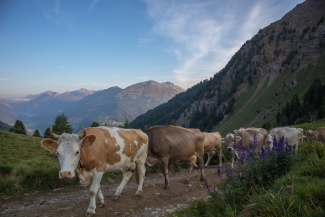
At the same time, hygiene standards have also risen enormously: «If you don't like cleaning, you're out of place on an alp,» laughs Aita mischievously. And indeed: when she is not busy milking and processing cheese, the cheerful woman diligently scrubs floors, cleans the milk dishes and cleans the tools used. This is essential to prevent germs from creeping in and compromising quality.
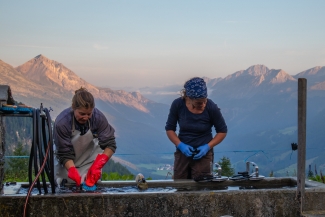
Large load
«Physically, such a summer in the Alps is a borderline experience. Of course, the routine makes things easier for me after so many years. Nevertheless, I notice that I am getting older and ask myself whether I will still be able to cope in the next 10-15 years,» Aita muses. But that's not all: in summer, her work as an alpine planner earns her many sympathies. She is all the sadder about how challenging it is to find a job for the remaining 8-9 months. The «Älplerstatus» is difficult to reconcile with a «regular life». Aita would like to see more support and flexibility from society so that this cultural asset, which is so important for alpine and agricultural regions like the Val Müstair, is not lost.
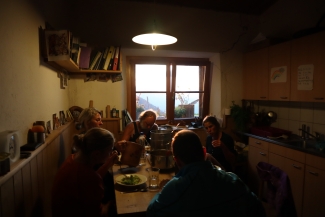
Farewell and gratitude
When the preparations for life on the alp begin at the beginning of June, it is marked by anticipation and a certain tension: What will the summer be like? For about 90 days, Aita, Berni and their 1-2 employees live completely in the rhythm of nature, «moving» with all their animals from Unteralp Marangun up to Alp Prasüra and back again. In addition to the cows, there are also some fattening pigs and a magnificent rooster and its hens.
In mid-September it's time for the departure from the alpine pastures. And with it the day of farewell, when the animals are elaborately decorated and led down into the valley to Sta. Maria. «Every year, the departure is a sentimental day for me. I am grateful when everything has gone well and am happy about the time I was able to spend on the alp. Saying goodbye to the animals is always difficult for me,» says Aita. And like the first time, the feeling grows at the same time that this should not be the last summer.


